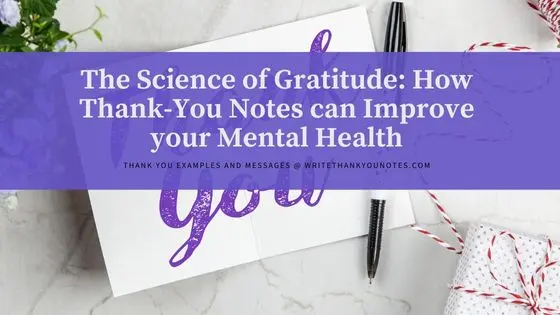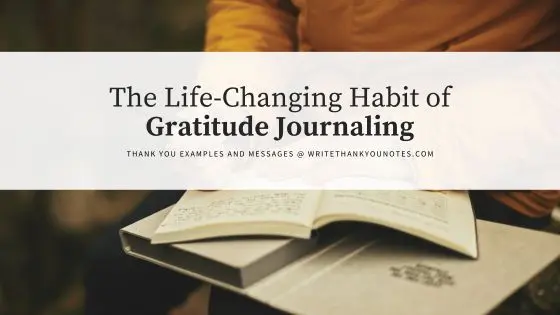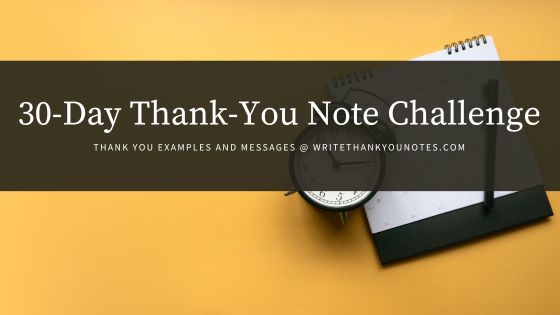You write a thank-you note to show appreciation to someone who has done something for you, but what many people don’t realize is that the act of writing a thank-you note can also do something positive to the mental health of the person who wrote the note.
Writing letters of gratitude increases the writer’s happiness and life satisfaction, while decreasing depressive symptoms.
It might be hard to think about when you’re feeling down, but if you can find ways to cultivate feeling grateful, you can actually lift your spirits and overcome feelings of sadness, anxiety, or depression. And, the good news is, you don’t necessarily need to seek professional help if you’re feeling overwhelmed or down.
All you need is a little gratitude!
Write to appreciate the small things, too
When you write a thank-you note, you are acknowledging that somebody has done something for you, which can make you feel valued and appreciated. This can be especially beneficial if you have had a tough few weeks or months, as it can help to boost your self-esteem and can make you feel more connected to the people around you. It can also be a great way to show appreciation for the small things in life. Whether it’s a kind word from a friend or a helpful gesture from a stranger, writing a thank-you note can make you appreciate the little things more and can bring a smile to your face.
Thank-you notes to focus on what is happening here, now
Writing thank-you notes can also help you to practice mindfulness. Writing out your thoughts and feelings can help you to be more conscious of the present moment and can help you to stay in the moment and focus on the good things in life.
Attitude of gratitude cultivated by writing thank-you notes
Writing thank-you notes can help you to develop an attitude of gratitude, which can help to reduce negative thoughts and can help you to stay positive even in tough times. Finally, writing thank-you notes can be a great way to express your feelings and can be a great way to connect with those around you.
Strengthen social cohesion via notes of appreciation
Writing a thank-you note can be a great way to tell someone how much they mean to you, and it can be a great way to show them that you appreciate them. Overall, writing thank-you notes can be a great way to boost your mental health and can help to reduce feelings of stress, anxiety, and depression. Writing out your thoughts and feelings can help you to stay mindful, can help to develop an attitude of gratitude, and can help you to show appreciation for the small things in life.
So why not take some time to write a few thank-you notes and reap the mental health benefits?
What is gratitude and why should you practice it?
So, what is gratitude, you ask? It’s simply acknowledging the good in your life, whether it’s tangible or intangible, and recognizing that it comes from outside of yourself. Gratitude helps you connect to something larger than yourself and, according to research in positive psychology, it’s consistently linked with greater happiness.
The practice of expressing gratitude or giving thanks in prayer has long been known to have a positive effect on mental health, so it makes sense that writing thank-you notes likewise encourages positive emotions and a better mindset.
Recent studies here have found that expressing gratitude through writing can have numerous psychological benefits, such as reducing feelings of stress and anxiety, and improving overall mental well-being.
Feelings of gratitude can help improve mood, reduce stress and anxiety, and increase self-esteem in both the person expressing the emotion and the person receiving the kindness.
You could write a gratitude journal or make a list of things you’re grateful for, yes, but writing thank-you notes is one way to express gratitude and reap its mental health benefits while sharing the positive effects with others. Double win.
But enough about others – this article will explore the science of gratitude and how writing thank-you notes can improve your mental health.
The benefits of feeling and expressing gratitude
The Science of Gratitude
The mental health benefits of writing gratitude letters are not entirely dependent on actually communicating that gratitude to another person.
So if you’re thinking of writing a letter of gratitude to someone, but you’re unsure whether you want that person to read the letter, we encourage you to write it anyway. You can decide later whether to send it (and we think it’s often a good idea to do so). But the mere act of writing the letter can help you appreciate the people in your life and shift your focus away from negative feelings and thoughts.
https://greatergood.berkeley.edu/article/item/how_gratitude_changes_you_and_your_brain
Research studies to explore the benefits of gratitude have found that expressing gratitude can lead to increased positive emotions, better sleep, improved relationships, and greater life satisfaction. Feeling gratitude affects the hormones in the body that are associated with mental health.
Mental health studies have shown that expressing gratitude can lead to increased levels of serotonin and dopamine, which are known to improve mood and self-esteem, and reduce stress and anxiety.
Thank-you note writing therapy
There are different ways to feel and express gratitude. You can be grateful for the past, present, and future, and the best part is, gratitude is a quality that can be cultivated and strengthened with time.
Researchers like Dr. Robert Emmons and Dr. Michael McCullough have conducted several studies on gratitude and have found that it has a positive impact on our overall well-being.
Want to cultivate gratitude in your own life?
It’s easy! You can:
- write thank-you notes,
- think about people who have helped you,
- keep a gratitude journal,
- and mentally give thanks for as much as you notice. Use your creativity to celebrate life.
And, did you know that expressing gratitude can even improve relationships?
A study of couples found that those who took time to express gratitude for their partner felt more positive towards them and more comfortable expressing any concerns about the relationship.
So, as you can see, gratitude can have a big impact on our lives. Why not give it a try today, even if it isn’t yet holiday season, and see how it makes you feel?
Writing thank-you notes & practicing gratitude
Go here if you want a refresher on writing a thank-you note, and follow the short summary below as a guideline:
1. Set a goal- Before beginning to write thank-you notes, decide on a goal. This could be to express gratitude to a certain number of people in a certain amount of time.
2. Choose the recipient - Think about who you want to express gratitude to. It could be a family member, friend, or even a stranger – perhaps the person who constructed your home and ran the pipes to your shower. These steps are more geared toward people you know and to whom you are writing a note.
3. Choose the timing - Decide when you will write the thank-you note. It could be immediately after receiving a gift or when you are feeling particularly grateful after a walk in the woods.
4. Choose the tone - The tone of the thank-you note should be appropriate to the recipient. For a close friend, you may choose to be more informal, while for a stranger, you may choose to be more formal.
5. Personalize the message - If you opt to write a thank-you note you intend to send, make sure to personalize the thank-you note to the recipient. This could include mentioning an event that you shared, a gift they gave you, or something you appreciate about them.
Then, mail it!
Health benefits of writing thank-you notes
1. Increased positivity - Writing thank-you notes has been found to increase positive emotions. Studies mentioned earlier have shown that by expressing gratitude and making it a habit you will experience greater happiness and life satisfaction.
2. Improved relationships - Writing thank-you notes has also been found to improve relationships. It can help strengthen bonds and foster deeper connections with those around you.
3. Increased self-esteem - Writing thank-you notes increases one’s self-esteem. The world needs more emotionally secure people leading the way.
Why not? Get writing for your own good!
In conclusion, expressing gratitude has a positive effect on mental, emotional, and physical health.
- Studies (and experience) show that expressing gratitude can lead to increased levels of serotonin and dopamine, which are known to improve mood and reduce stress and anxiety.
- Writing thank-you notes is an easy and effective way to express gratitude and reap its mental health benefits.
- Writing your appreciation leads to increased positivity, improved relationships, and increased self-esteem.
- So, if you want to improve your mental health, start writing thank-you notes today. Being selfish is loving.
Writing thank-you notes to people you love is an easy and effective way to improve your mental health. Make it a part of your daily routine and start to reap the benefits today.




